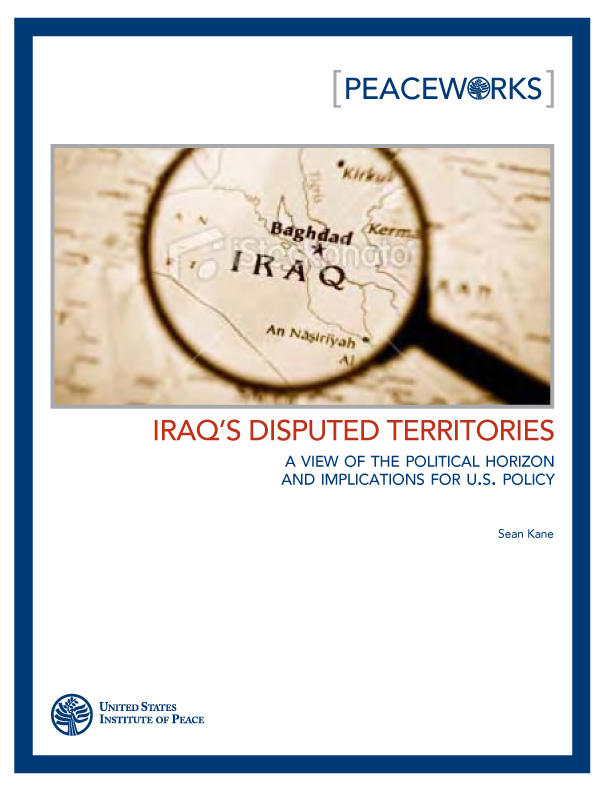Iraq's Disputed Territories
According to U.S. government officials, the greatest potential threat to Iraq’s stability is not extremist groups but the prospect of Arab-Kurdish conflict over oil-rich Kirkuk and other disputed territories. This report attempts to demystify and disaggregate the often poorly defined disputed territories by drawing upon two data sets: the political preferences expressed in these territories during Iraq’s three postconstitution elections and archival records detailing these areas’ respective administrative histories.

News Release: "U.S. Institute of Peace Publishes New Report on the Disputed Territories in Iraq" (English | العربية)
Summary
- The alternation of military conflict and negotiation over what areas of Iraq are Kurdish and what autonomy Kurds should exercise in these areas has been an episodic feature of modern Iraq’s history. The net result is a tangled web of administrative and security arrangements between the Iraqi government and Kurdish regional authorities that sit atop poorly defined internal boundaries amid a toxic legacy of mistrust.
- According to U.S. government officials, the greatest potential threat to Iraq’s stability is not extremist groups but the prospect of Arab-Kurdish conflict over oil-rich Kirkuk and other disputed territories. This is especially the case when the vacuum caused by the lack of an agreed political and constitutional framework for Iraqis to address competing claims to these strategic lands is combined with the impending withdrawal of what are effectively U.S. peacekeeping forces in northern Iraq.
- This report attempts to demystify and disaggregate the often poorly defined disputed territories by drawing upon two data sets: the political preferences expressed in these territories during Iraq’s three postconstitution elections and archival records detailing these areas’ respective administrative histories. These data sets have definite limitations but taken together offer a valuable entry point for defining the contours of the dispute.
- Clearly, sovereign Iraqi authorities must, and will, decide the shape of any territorial compromise and the overall nature of the relationship between the Kurdistan region and the federal government. Nevertheless, the parties to the dispute consistently display a “nothing is agreed until everything is agreed” mentality, indicating that possible tradeoffs can only be considered in the context of a comprehensive territorial agreement.
- While it is likely to prove controversial, the evidence in this report hopefully can provide an informal, low-risk, but detailed view of what possible negotiated solutions to the disputed territories might look like and thereby begin to illustrate the potential parameters and compromises involved in reaching a comprehensive agreement.
- In such a deal, past suffering makes an eloquent case that the Kurds are owed selfgovernment within Iraq and the enhanced security that would come from clarity on the Kurdistan region’s internal boundaries. In return, the Kurds would need to demonstrate not only their commitment to the territorial integrity of Iraq, but also a commitment to an Iraq that works by allowing for the emergence of a constitutional basis for an appropriately empowered national government outside of the Kurdistan region. Both Baghdad and Erbil would also need to be prepared to make territorial concessions and to accept a compromise status for Kirkuk that has no outright winner or loser.
- The U.S. government has an important role in clarifying this picture and should clearly communicate the rewards that the United States would be willing to provide to both parties for reaching a comprehensive agreement, particularly as it relates to security and diplomatic cooperation.
- While it is unlikely that an Arab-Kurdish deal can be reached by the scheduled U.S. troop withdrawal date of December 2011, the United States should now make it a priority to work with the new Iraqi government to determine whether the space can be created to launch a negotiating process to peacefully resolve what might be the greatest threat to Iraq’s stability.
Read commentary on the report by senior Iraqi figures:
Dr. Iyad Al-Sammarrae
Member of the Iraqi Parliament
Former Speaker of the Iraqi Parliament
Former Deputy Chairperson of the Constitutional Drafting Committee
Dr. Mahmoud Othman
Member of the Iraqi Parliament
Former Member of the Iraq Interim Governing Council
Chief Negotiator for Mullah Mustafa Barzani on the 1970 Autonomy Accord
Hassan Toran
Member of the Turkoman Justice Party
Chair of the Kirkuk Provincial Council
About the Report
The views expressed in this report are those of the author alone. They do not necessarily reflect the views of the United States Institute of Peace.
This report could not have been conceived of, much less written, without the factual information and primary evidence gathered over the space of several years of painstaking effort by dozens of former and current staff members at the United Nations Assistance Mission for Iraq. The author wishes to salute their exceptional work in difficult and often dangerous circumstances. He would also like to thank several individuals at the United States Institute of Peace and in the United States government for reviewing this report and providing thoughtful and insightful feedback.
The analytical judgments contained in the document, as well as any remaining errors or inaccuracies, are solely the author’s responsibility. The author realizes the sensitivity and emotion attached to the territorial disputes in Iraq and the legacies of conflict and discrimination addressed in this report. The annexes summarize the evidence used for the analysis in the main text so that readers are free to examine the relevant data for themselves, consider differing conclusions, or argue that alternative factors should have been used to imagine what a negotiated solution to the disputed territories might look like. The report’s ultimate aim is to stimulate a concrete discussion on how this long-running and often tragic dispute can be resolved peacefully.
Give us your thoughts at iraqs_disputed_territories_report@usip.org.
Explore Further
- Read a Q+A with the report's author, Sean Kane
On the Issues | April 18, 2011 - U.S. Institute of Peace Publishes New Report on the Disputed Territories in Iraq
News Release | April 4, 2011 - Countries: Iraq



